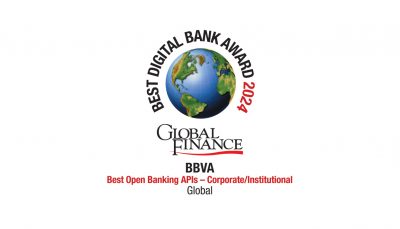What are the main challenges faced by open banking, and what will be the impact of the changes arising from the COVID-19 pandemic? This question underlay the latest Open Banking World Congress, a meeting point for banking professionals, technology experts and managers of fintech companies.
One of the key points of this new scenario is the transition from traditional banking to a type of banking industry that encompasses new financial services. Carmela Gómez, head of Open Banking at BBVA, explained BBVA’s experience during the Old Banks, New Ambitions panel, a roundtable moderated by Carlos Figueredo, CEO and founder of Open Vector, with Martin Sladecek, head of Open Banking at the Czech bank Komercni banka, Julia Holzgreve, head of Open Banking & Ecosystem Partnerships at Keen Innovation, and Paul Freemantle, co-founder and CTO of WSO2.
“Open banking aims to provide users with more efficient and personalized services, as well as to offer banks a good opportunity for innovating, streamlining processes, creating new business models and opening new markets,” Gomez said.
Society is changing, and banks have to adapt to the new times. BBVA’s head of Open Banking explained that in the past, customers visited the bank branch to get information and arrange their products; now, users expect banks to approach them, offering different financial solutions through platforms that do not necessarily have to be related to the banking environment itself. In fact, thanks to open banking both companies and users will have better options to find what they need.
Gómez went on to mention the BBVA app as a good example: where customers can access all the information about their accounts and cards in different banks from a single application. “This has transformed not only the way customers view banks, but also the internal structure of the bank itself. At BBVA, we see open banking as a strategic opportunity for offering a better digital experience to people and for helping companies, and the bank itself, with the digital transformation necessary to carry this out,” said the head of Open Banking.
This new paradigm allows us to explore new business models to attract new customers and businesses in the new ecosystem, as well as build business networks with new business partners. These strategic alliances, Gómez noted, also allow the possibility for adding third-party services to BBVA’s platform, which make it more attractive, creating new experiences and participating in ecosystems that generate great added value for both banks and their customers.
“To do this, at BBVA, we have built strategic alliances with other companies, such as Uber in Mexico, where BBVA was the first bank to offer its product in a third-party application,” BBVA’s head of Open Banking pointed out. Through APIs, BBVA provides drivers with access to real-time payment features and other banking transactions and operations directly from the Uber app.
Standards, a turning point

For Martin Sladecek, “the case of BBVA and Uber is the classic example of what can be achieved, not only because it combines fintech and banking, but because it takes a responsible step to serve people who do not use banking services.” It is an opportunity, he added, for doing good business and for doing good things.
This type of one-off alliance is also the engine of open banking in Switzerland, where the second European payment services directive (PSD2) does not apply, and where there is no other regulation that acts as a stimulus, said Julia Holzgreve. This lack of standards in the Helvetic country, said the head of Innovation at Keen Innovation, poses a risk, and adjustments may need to be made later.
“Creating standards will change the way companies, partners, banks work…the way each and every player in this ecosystem works,” said Carmela Gómez (BBVA). There are many examples of how standards have driven growth in other industries, from video to printers. “In open banking, implementing standards is crucial,” Gómez said, “and the sooner they are established, the sooner we’ll see this market grow.”
In this regard, Sladecek stressed how in the Czech Republic there is a sectoral movement for the creation of a common standard that will allow all players to connect easily, resulting in much more agile and effective operations. “But it also costs a lot of money to prepare for it,” the Czech bank’s head of Open Banking underscored. The next step, Holzgreve added, is to find the business cases to monetize this economic effort.
And commercial options seem to come from collaboration. “I see a systemic and consistent change in traditional banks, how they want to alter their strategy and focus on the customer, and look for new opportunities that don’t come directly from interacting with consumers, but from being a part of an ecosystem,” Freemantle explained.
It is essential to change the mindset based on a closed system toward an open ecosystem involving many companies, entities and users.
In addition, there is ample space for innovation, no matter the size or place. Carlos Figaredo, of Open Vector, gave the example of some areas of Africa, where they have made remarkable advances in collaboration between banks and fintechs of all sizes. Freemantle added the example of Societé Générale, a traditional bank that is boosting open banking in Africa by creating mobile banking apps to reach people who do not use banking services and to compete with the ubiquity of digital wallets.
It is time to be creative and reach places where banks do not yet have a presence. “Open banking can be a huge expansion of your distribution network,” Sladecek said, giving the example of possibly developing financial applications to use, for example, in connected cars. “Let your imagination run wild” and create new use cases that you would never have thought of until now, suggested the Czech head of Open Banking.
A new scenario

Could banks disappear if they don’t adapt to this new reality? Not necessarily, Sladecek replied, but they would be missing a good chance. Current regulations, especially at European level with the PSD2, mean that banks have to comply with the new legal requirements; and these create a scenario connected by APIs and of competition for the interest of users with third-party suppliers that will bring new services to market. But they can also build on this new situation and harness the potential to grow in uncharted territories.
In Holzgreve’s opinion, what we could see is how banks sometimes leave the front line. However, other paths are opened, such as “banking as a service,” where banks become invisible by pushing other businesses from behind. Direct interaction with customers, Holzgreve noted, which has always been one of the assets of banks, is sometimes moving to the background and also bearing new fruits. The key will be for each of the players to enhance their specific strengths in this open ecosystem.
“This new model provides users with applications and processes that have never existed before,” Gómez said. And for a bank, making them come true is no easy task; BBVA’s head of Open Banking pointed to the strong investment in technology, as well as the necessary changes in internal processes to enable third-party providers to access customer data while ensuring security and privacy. Finally, operating from the cloud provides essential agility in our connected society, but that can sometimes clash with regulation, as in the case of Turkey. All this considering that banking is a highly regulated sector.
Fremantle closed the roundtable with a categorial sentence: “APIs are the product of the 21st century, but we have some lessons to learn.” Looking ahead, the co-founder of fintech WSO2 believes it is essential to “integrate supply chain APIs; we need to be able to manage APIs, logistics and supply, from the backend to our partners to different ecosystems, through a federation, and create a fully integrated network. Only a handful of companies have realized this, and banks haven’t reached that point yet.”




























